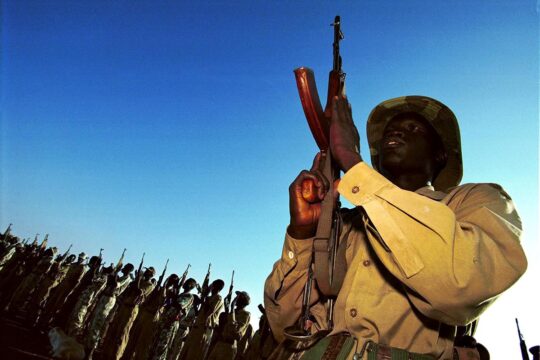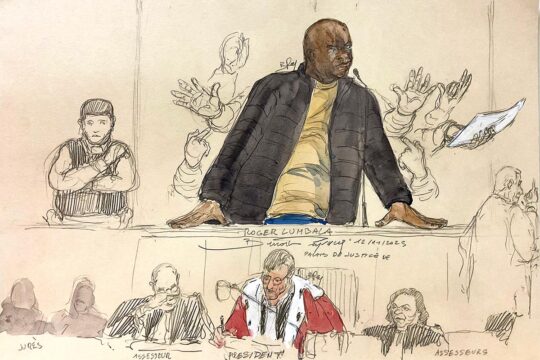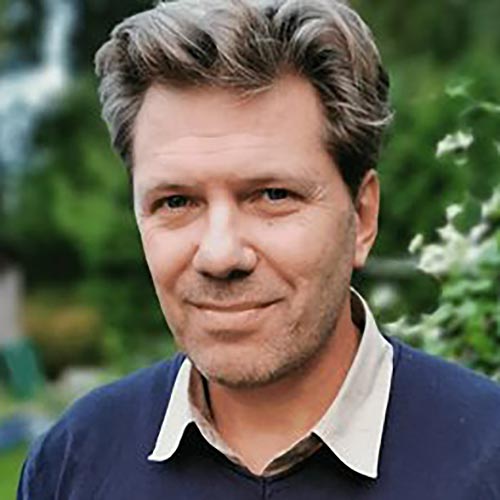On this seventh day, in the third week, Swedish judicial authorities published a surgically precise programme for the trial of Ian Lundin and Alexandre Schneiter, the former two heads of Swedish company Lundin Oil charged with complicity in war crimes in Sudan between 1999 and 2003.
Never before has a trial lasted so long in Sweden - two and a half years. Never before have the directors of a company found themselves in the dock on such a charge. At 9.15am on Tuesday September 19, 2023, the seventh day of the 307-day trial began. The trial is in its third week. Hearings take place from Tuesday to Thursday only. The 307th day of this extraordinary trial is set to fall on February 19, 2026. And it is now nearly 30 years after the directors of Lundin, renamed Orrön Energy last year, bought the rights to exploit the oil field in "block 5A" -- an area located in what has now become South Sudan.
Up the grand staircase to Room 34
The Stockholm Court House building dates back over a century and is one of the jewels of Sweden's romantic era, lending a certain gravity to the case. After passing through the security gate and the large entrance gallery where the usual courthouse crowds mingle, you climb the massive staircase to Room 34, on the second floor. This monumental room regularly plays host to trials that stand out. Last year, the brothers Payam and Peyman Kia were tried here for spying for Russia. Five years ago, Frenchman Jean-Claude Arnault was tried here for rape, a crime that tarnished the Swedish Academy, where his wife sits, and provoked waves right up to the Nobel Prize for Literature.
There are no crowds on this floor, which gives it a certain intimacy. In room 34, to the left of the stairs, the walls and ceilings are lined with geometric woodwork. The court president, a young, bald man with a long face and narrow shoulders, begins by settling a procedural detail between the lawyers of Ian Lundin and Alexandre Schneiter, and the team of six prosecutors to his right. In principle, under the Swedish system, you cannot simply refer to a document and have it entered into the file as evidence. You have to read every single report. Lundin's lawyer tolerates one exception.
Opposite the court president, behind the row where Schneiter and his four lawyers are seated, are two representatives of Orrön Energy AB, the new name of Lundin Oil/ Lundin Petroleum. Behind them, in the third row of chairs, sit the two lawyers for the civil parties on one side and two interpreters on the other side, who are there solely for Swiss citizen Schneiter. He is the only one who does not understand Swedish, and sometimes wears headphones.
Livestock slaughtered, civilians killed by army
At the far end of the room, behind the three rows of seats, there are two more rows of chairs for the press and public. This Tuesday, a few journalists, researchers and lawyers are there - eight people in all, which is not many. The room is emptier than last week, the second week of the trial. The relatives of the two defendants are no longer there. There are already fewer journalists.
Prosecutor Karolina Wieslander began her presentation by reading extracts from a UN report on Sudan dated January 30, 1988. She spoke of attacks on civilians, population displacements, and fighting between the government in Khartoum and the SPLA (Sudan People's Liberation Army) guerrilla movement. "All the parties are responsible for this violence against the population." Extracts from the report were projected onto four screens partly covering the walls, two behind the prosecutors and two in front of them.
She then moved on to another UN report dated May 17, 1999, a year after the previous one. It was "shortly after Lundin Oil had made its discovery in Block 5A and the army had moved in", the prosecutor explained. She spoke of cattle being slaughtered, civilians being killed, rape and looting by government troops, reading out in English from the report of the Special Rapporteur on the situation of human rights in Sudan.
Reading from this report was lengthy. It underlined the importance of the oil regions in these conflicts, including the famous block 5A. It seems damning, both for the Sudanese army and for the oil company, which is accused of being complicit in the army’s crimes. The report describes the displacement of populations, suspected of supporting the rebellion that is sabotaging oil installations. It speaks of a buffer zone of 100 square kilometres established around the oil installations. At the end of point 85 of the report, the prosecutor asked for a break. It was 11 o'clock. Everyone made their way down the two flights of stairs and into the cafeteria.
"Everyone already has an opinion"
It has to be said that the Swedish media are not coming in droves.
"It's hard to get people interested," says a journalist at Swedish business daily Dagens Industri. Another Swedish journalist takes a different view. Martin Schibbye, editor-in-chief of the Blankspot website, says: "I find that there are new things every day, particularly last week when the results of the search of Lundin's Geneva offices were presented, along with Carl Bildt's E-mail.”
Carl Bildt is the former conservative prime minister and foreign minister who will be called to testify… in 2025. He was a member of Lundin's board of directors at the time of the events. In the E-mail quoted at the hearing, dated June 19, 2001, he warned Lundin's management of the complications of working in an area where Khartoum was carrying out harsh repression, which would isolate Sudan internationally. "We must not appear to be defending the regime," Bildt warned.
“When Carl Bildt comes to testify, it will attract a lot of journalists,” says Schibbye. “The same for the questioning of the defendants.” But in fact, interest from the Swedish media is limited. Perhaps, as the two reporters say, because the story is already 20 years old. “Everyone has already had an opinion on the affair for 20 years," says Schibbye. “Either Lundin was there to help the country out of poverty, or they are guilty. People aren't too interested in the nuances".
After the break, the reports continued to be read, one from the US State Department and another from the NGO Human Rights Watch. The findings looks as damning as before for Lundin. After the lunch break, the prosecutors resumed reading a report on famine in Sudan. There’s reference to a report from security companies working for other oil firms, who mention the high risk that oil represents in this region. The two defendants listen, each in their own row. Lundin's lawyers will have to wait until November 29 to give their version, and Schneiter's until February 20. At 4.30pm, the seventh day of the trial comes to an end.








